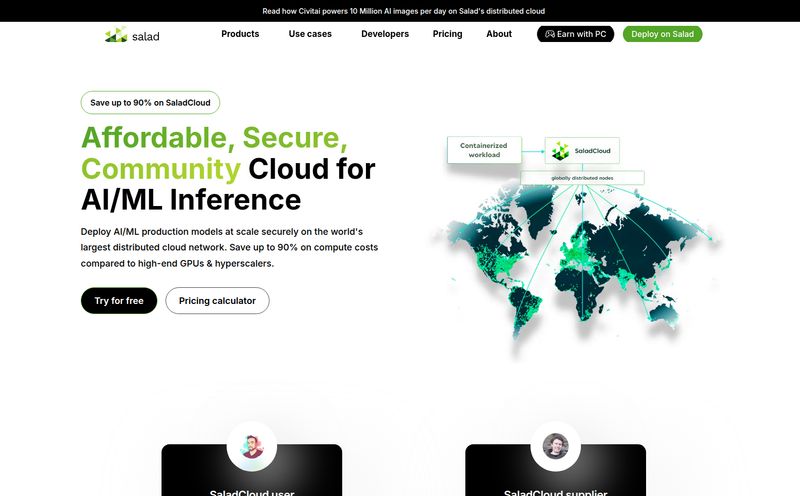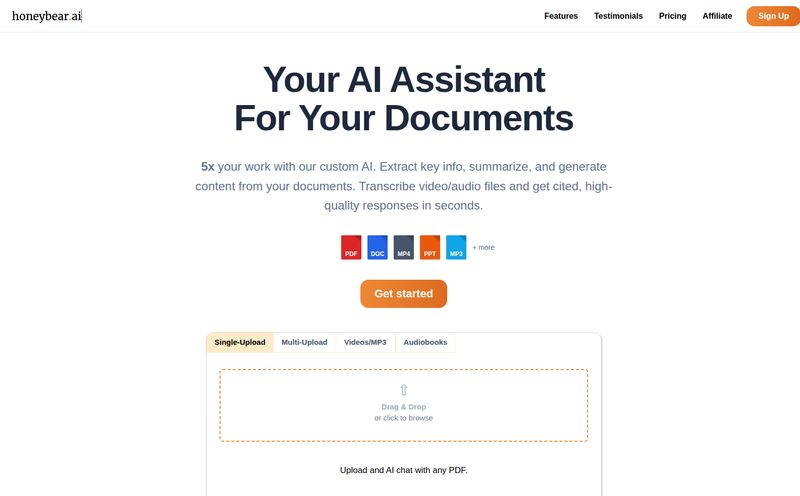If you run any kind of platform that accepts user-generated content (UGC), you live in a state of low-grade panic. What did someone just upload? Is it brand-safe? Is my community manager going to need therapy after their shift? The internet is still the wild west in many ways, and moderating the flood of images and videos is a Herculean task. It's expensive, it's draining for human teams, and things inevitably slip through the cracks.
For years, we've been promised AI would be the solution. A tireless, unshockable gatekeeper. I've tested a lot of these so-called solutions, and frankly, many are either clunky, insanely expensive, or about as accurate as a weather forecast a month out. So, when I stumbled upon Deepengin, I was skeptical. But after digging in, I’ve got to say, I'm pleasantly surprised. It feels... practical. Like it was built by people who actually understand the moderation grind.
So, What Exactly is Deepengin?
On the surface, it’s an “all-in-one API for image and video content moderation.” Standard marketing stuff. But what does that actually mean for you and me? Think of Deepengin as a highly-trained, automated security guard for your website or app. You feed it the content your users upload—photos, videos, even live streams—and its AI brain instantly checks it against a whole list of potential problems. It’s built to be plugged directly into your existing platform, so it works behind the scenes, 24/7, without needing a coffee break.
Unlike some black-box systems, the goal here is pretty clear: automatically detect and filter the stuff you don’t want, so you can protect your brand’s reputation and keep your community safe. Simple as that.
The Toolbox: What Can It Actually Detect?
An API is only as good as its features, right? Here’s where Deepengin starts to look pretty robust. It’s not just a one-trick pony.
Content Safety First and Foremost
This is the bread and butter of any moderation tool. Deepengin covers the big, critical categories you'd expect. We're talking about robust Nudity detection to filter explicit content, which is table stakes for any social platform. It also flags Arms, liquor, and narcotics, a feature that’s becoming increasingly important for platforms aiming for a family-friendly or globally accessible image. And of course, it includes detection for Rude Gestures and Offensive and Hate Signs. This is the stuff that can turn a thriving online community into a toxic swamp overnight. Having an automated first line of defense here is a lifesaver.
Smart Recognition Features
This is where things get more interesting and move beyond simple filtering. The API includes Recognition of Celebrities, which has some niche but powerful use cases—think preventing unauthorized use of celebrity likenesses in user-uploaded designs or spotting potential misinformation campaigns. There’s also Text Detection in Images, which is fantastic for catching problematic phrases or contact info hidden in memes or screenshots, a classic tactic used by spammers. I’ve also been impressed by its Facial Similarity Detection. This isn't just for fun; it's a serious verification tool, useful for things like profile picture validation or spotting duplicate accounts using the same person's face.
A Sign of the Times: PPE Detection
I have to mention this one because it shows an awareness of current events. The ability to detect if a person is wearing Personal Protective Equipment (PPE) like a face mask is… specific. But for certain business applications, like verifying compliance in workplace photos or analyzing public health data, its a surprisingly forward-thinking feature. A nice touch.
For My Fellow Devs: Is Integration a Headache?
Nope. And I don’t say that lightly. This is often the part where great ideas fall apart. You find a cool tool, but it takes a senior engineer two weeks and a gallon of coffee to get a simple “Hello, World!” response. Deepengin seems to have avoided this pitfall. Their whole pitch is “simple developer integration,” and from what I can see in their documentation, they mean it. The API requires minimal coding to get started. It’s a REST API, which is standard stuff. They promise comprehensive documentation and SDKs to make life even easier. This means you’re not building a custom integration from scratch; you’re just plugging a well-documented service into your stack. For a startup or a small team, that's a massive win.
Let's Talk Turkey: The Pricing Structure
Okay, the big question. How much does this magic cost? I was genuinely shocked to find a clear, transparent pricing page—a rare gem in the world of B2B APIs. They didn’t even make me talk to a sales rep. Here’s the breakdown:
| Plan | Price/Month | Operations/Month | Key Features |
|---|---|---|---|
| Starter | $9 | 3,000 | Great for testing or very small projects. Attribution required. |
| Professional | $29 | 10,000 | Commercial use allowed, plus email/chat support. |
| Scale | $99 | 50,000 | Dedicated support and domain whitelisting. |
| Enterprise | $349 | 250,000 | Higher limits, no attribution, top-tier support. |
There's also a Custom plan for the big players. One crucial detail from their FAQ is what an “operation” is: essentially, one check on one image. So running Nudity Detection on a single photo is one operation. For video, the default is one operation per second of video. This pricing is, in my opinion, incredibly accessible. A $9/month entry point is practically unheard of. It lets anyone from a solo developer to a small startup get their feet wet with enterprise-grade moderation without breaking the bank.
The Good, The Not-So-Bad, and The AI Reality
What I'm Really Liking
First off, the automation and scalability. The ability to handle millions of images is exactly what growing platforms need. Second, the easy integration. This cannot be overstated. A powerful tool you can't implement is just shelfware. Third, the comprehensive feature set covers both essential safety and smarter, nuanced checks. And finally, that transparent pricing. It builds trust. Seeing those logos like Envato, Samsung, and Flickr on their homepage also adds a ton of credibility.
A Quick Reality Check
Is it perfect? No AI is. The biggest caveat, and this applies to any tool in this space, is that its effectiveness relies on the accuracy of the computer vision models. There will be false positives and false negatives. A blurry photo of an elbow might get flagged as nudity. A cleverly disguised hate symbol might slip through. That’s why these tools are best used as a powerful first-pass filter, not a complete replacement for human oversight in sensitive cases. The goal is to reduce the volume for human moderators from a firehose to a manageable trickle.
So, Who Should Be Using Deepengin?
The list is pretty long, actually. If you're building a social media app, this is a no-brainer. Same for any platform with forums or discussion boards. E-commerce sites that allow user reviews with photos can use it to keep their product pages clean. Dating apps, for obvious reasons, need this yesterday. Even gaming platforms with custom avatars or shared screenshots could benefit. Essentially, if an end-user can upload a pixel to your platform, you should be looking at a tool like Deepengin.
My Final Thoughts
I came in with my usual dose of SEO-blogger cynicism, and I'm walking away impressed. Deepengin isn't trying to be some ethereal, world-changing AI. It's a tool. A practical, well-designed, and fairly priced tool that solves a very real, very stressful problem for a lot of businesses. It makes advanced content moderation accessible, which is a big deal.
It strikes a great balance between power and simplicity. It's robust enough for a large enterprise but accessible enough for a solo dev with a dream. In the ongoing battle to make the internet a slightly less chaotic place, Deepengin feels like a genuinely useful weapon to have in your arsenal.
Frequently Asked Questions
- Is there a free trial for Deepengin?
- Yes, Deepengin offers a free trial that lets you test out the Video Moderation API with a limited number of requests. The Starter plan at $9/month is also a very low-cost way to test all the features extensively.
- What payment methods does Deepengin accept?
- They accept all major credit and debit cards, including Visa, Mastercard, and American Express, processed through Stripe. They also mention you can contact their support for alternative payment arrangements if needed.
- Can Deepengin moderate live video streams?
- Yes, the homepage explicitly states that the API can detect and filter unwanted content in photos, videos, and live streams, offering real-time moderation capabilities.
- What is considered a single 'operation' in their pricing?
- An operation is a single action by the API. For example, running nudity detection on one image is one operation. For video moderation, the number of operations depends on the video's length, with the default being one operation per second of video.
- Is there a minimum usage requirement?
- No, there is no minimum usage. You can use it for as little as a few operations per month on the Starter plan or scale up as your needs grow.



